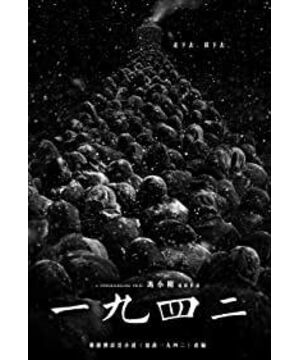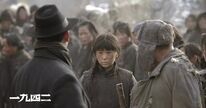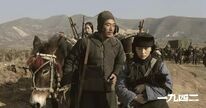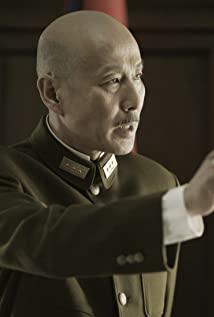In the drought of 1942, happiness was beyond our imagination. What's more, there is almost no so-called inheritance relationship between the people in the turbulent times and the current us except for the commonality of yellow skin and dark eyes. The fault is so, how to shorten the distance between the screen and the audience, I think it is Feng Xiaogang's most important issue in "1942". Obviously, Feng's film's mentality of seeking change and stability has been fully implemented in the film: although I clearly realized that this film belongs to Feng Xiaogang only when the two-character line of "animal" appeared in the first place in the opening scene, and For more than two hours after that, I was constantly reminded by the ruffian dialect and some small ironies, but what I got was a grand narrative that gave up the Beijing-style story, gave up the focus of sensationalism, gave up the deliberate splicing of coincidences, etc. Even if it is not round, it is enough.
This film is a feature film that starts from the restoration of recorded events and extracts threads from real interview materials. This is a shortcut to connect a large number of branches of this heavy theme, just like the existence of Gu Zidi and Yuan Ni can bring out enough storytelling. The "Assembly" is the same as "Tangshan Earthquake", the difference is that this time he chose a group portrait with many roles to take care of, and there was no sensational firepower concentration. The owner Lao Fan, the long-term worker blind deer, the blind deer's wife Huazhi, the bachelor Shuanzhu, the wartime court elder Ma, the chores-ridden Chiang Kai-shek, the then chairman of the Henan Provincial Party Committee Li Peiji, the American reporter Bai Xiude who insisted on covering the drought and locust plague, etc. Wait, the whole ecology has collected all kinds of people who experienced this incident in those years. The freshness of several main characters has not been overshadowed by the lack of control of the multi-line narrative. This is the first time that Feng's film has focused so much on the depiction of the main crowd, rather than focusing on the key points. No matter what social status you have, what choices and countermeasures you may face when facing the same problem of drought, locust plague and starvation, the film presents great richness and uncertainty due to the different roles. "1942" gives each character a position that tries to restore the facts (real characters) and is infinitely close to the historical facts (fictional characters), so the cross-editing that makes feature films and documentaries coexist is cold and hard as if they have no body temperature .
I can't tell how many main lines the film uses, but it's just the official scenes of Chiang Kai-shek, Li Peiji and others. On the one hand, they are neutral to the fact that Chiang Kai-shek turned a deaf ear to the Henan disaster, and on the other hand, they carefully expose the corruption of grass-roots cadres. The turmoil during the war also gave more negative factors to the catastrophe; the fugitives centered on the clue character Dongjia Lao Fan, the reporter Bai Xiude, the missionary An Ximan, and the senior officials like sesame seeds. Ma et al., the frequent occurrence of black humor makes ordinary people truly the best support for character diversification. For more than two hours, the two baselines formed by groups belonging to the two extremes of the wartime society were intertwined, showing the ecology under the famine as completely as possible. But after all, due to some well-known reasons, the story involves only a few cruelties (the killing scenes that can cause high national emotions in the film are indeed soul-stirring and not few), and the more bleak truth has long been buried by time. "42" is also not about who is right and who is right. Maybe a kind of mentality of taking history as a mirror is refined in the restoration, and the film will have a possible positive meaning.
In the second half of the film, death appears more intensively than in the first half. After the wartime court was revoked and the priest Anximan questioned the love of God, let the emotions of disorder and trustlessness spread clearly in every death. So no matter how black humor is placed, the film always goes to the deepest despair. On the screen, it is extremely tragic. How would you react under the screen? Its reference value is worth pondering. If the audience silently leaves the scene after watching the film, and then makes a comment on the major emotional high grounds in the film, is it the success of the film or the sadness of the audience? Fortunately, the last scene of the film suddenly came to light. When the old club went against the flow of people at the end of the drought just to die closer to home, he met a little girl who was also alone. The ending of holding hands and running after shouting grandpa is gentle, even if it can't resolve the 90% of the cold despair in front of it, it is the best embodiment of the film creator's tolerance and tradition.
"1942" does not have the lyricism of the large paragraphs, and does not see the market in the northern population. In the special soil of mainland movies, Feng Xiaogang completed the film as neatly as possible in his own way. It does not present a positive theme in the way of common red movies, but puts the history to the present day of the 21st century with the calmest possible onlooker mentality and shows it to the audience under the screen. I have no way of predicting how it will work, but what is certain is that the famine in 1942 was known to many people in the enchanting and prosperous twenty-first century. Both history and the present are a kind of memorial that connects life and death, but what is worth paying tribute to depends on each person.
View more about Back to 1942 reviews











